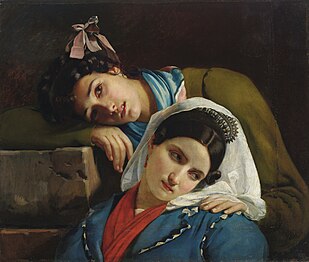François-Joseph Navez
François-Joseph Navez | |
|---|---|
 Self-portrait (1826) | |
| Born | François-Joseph Navez November 16, 1787 Belgium |
| Died | October 12, 1869 (aged 81) |
| Resting place | Laeken Cemetery |
| Education | Brussels Royal Academy of Fine Arts |
| Occupation | Painter |
| Spouse | Augustine-Flore de Lathuy |
François-Joseph Navez (16 November 1787 in Charleroi – 12 October 1869 in Brussels) was a Belgian Neoclassical painter; known for his portraits and genre scenes.[1]
Biography
[edit]As the son of an alderman, in a privileged family, he was able to devote himself entirely to art from an early age.[2] From 1803 to 1808, he was a pupil at the Royal Academy of Fine Arts in Brussels, where he studied with Pierre Joseph Célestin François. In 1810, together with Antoine Brice and Antoine Cardon, among others, he helped create the "Société des amateurs d'arts".
In 1812, he was awarded first prize in a contest for history painting. This enabled him to go to Paris, where he worked and studied with Jacques-Louis David from 1813 to 1816. The following year he went to Rome, where he made the acquaintance of Ingres. He would live and work there until 1822.[3]
Upon returning to Belgium, he set up a studio. In 1825, he married Augustine-Flore de Lathuy (1798-1867), the daughter of a judge. When he became established, he began taking students. Alfred Cluysenaar, Fanny Geefs and Auguste Danse were among the more notable. In 1852, his best-known student, Jean-François Portaels, married his daughter Marie-Hélène (1828-1855).[4]

Navez was elected a fourth class member of the Royal Institute of the Netherlands in 1826, he became a supernumerary associate in 1841 and resigned in 1851.[5] In 1830, he was named a member of his alma-mater, the Royal Academy. He was one of the founding members of the Royal Monument Commission, created in 1835. That same year, he was appointed Director of the Royal Academy.
During the 1850s, he lost several close friends and family members. In 1863, he resigned from the Academy, citing health problems. He died in 1869, in the company of Portaels and his wife's relatives, and was interred at Laeken Cemetery. Streets have been named after him in Charleroi and Schaerbeek.
Main works
[edit]
- 1816 : Sainte Véronique de Milan, Museum of Fine Arts, Ghent.
- 1816 : La Famille de Hemptinne, Royal Museums of Fine Arts of Belgium, Brussels, Belgium.Museum of Fine Arts, Ghent
- 1819 : Scène de musique, Museum of Grenoble.[6]
- 1821 : Scène de brigands, Private collection.
- 1829 : La Nymphe Salmacis et Hermaphrodite, Museum of Fine Arts, Ghent.[7]
- 1830 : Songe d'Athalie, Royal Museums of Fine Arts of Belgium, Brussels, Belgium.
- 1831 : Portrait d'un jeune homme songeur
- 1832 : Portrait of Theodore-Joseph Jonet and his two daughters, Groeningemuseum, Bruges.[8]
- 1836 : Portrait de David, Montreal Museum of Fine Arts.
- 1844 : Notre-Dame des Affligés, Chiesa di S. Antonio, a Charleroi.
- Trois Dames de Gand, Louvre, Paris.
Gallery
[edit]-
Leonard du Bus de Gisignies (1836)
-
The Incredulity of
St. Thomas (1823) -
Massacre of the Innocents (1824)
-
Jacques-Louis David (1817)
-
The Spinners of Fondi (1845)
-
The Sick Child (1844)
-
Goswin de Stassart (1836)
-
Hagar in the desert (1819)
-
Bust of the Virgin (Our Lady of Sorrows)
-
Two Italians (1821)
References
[edit]- ^ "Navez,François Joseph", Benezit Dictionary of Artists, ISBN 978-0-19-977378-7 (Online @ Grove Art)
- ^ Marius des Essarts, "La carrière brillante et la fin douloureuse de François Joseph Navez", In: Le Journal de Charleroi, 21 November 1937
- ^ "Navez", In: L'Indépendance belge, 18 May 1870
- ^ Marius des Essarts, "La carrière brillante et la fin douloureuse de François-Joseph Navez", In: Le Journal de Charleroi, 21 November 1937
- ^ "François Joseph Navez (1787 - 1869)". Royal Netherlands Academy of Arts and Sciences. Archived from the original on 5 July 2020.
- ^ "Grenoble achète un tableau de Navez" In: La Tribune de l'Art, July 2019
- ^ . New International Encyclopedia. 1905.
- ^ "Groeningemuseum - Room 6".
Further reading
[edit]- Louis Alvin, Fr. J. Navez, Sa vie, ses œuvres et sa correspondance, Brussels, Bruylant-Christophe et Cie, (1870)
- Alain Jacobs, “ Les tableaux du peintre F.-J. Navez au Musée du Louvre ”, in Revue du Louvre, 4 October 1998, p. 46-58
- Denis Coekelberghs, Alain Jacobs and Pierre Loze, François-Joseph Navez, la nostalgie de l'Italie (exhibition catalogue), Musée des Beaux-Arts de Charleroi, Musée de La Chaux-de-Fonds, Musée de Coutances, (2000)
- Alain Jacobs, "Lettres d’amis sculpteurs français adressées à Navez", in Cahiers de l’IRHiS, n° 2, Charles de Gaulle University – Lille III, 2007
- P. & V. Berko, "Dictionary of Belgian painters born between 1750 & 1875", Knokke (1981), pgs. 488–489.
External links
[edit]- Denis Coekelberghs (29 February 2008). "François-Joseph Navez. Quelques nouveaux tableaux, dessins et autres documents". La Tribune de l'art. Retrieved 6 March 2014.
- Entry on Navez @ Geneanet
- 1787 births
- 1869 deaths
- Artists from Charleroi
- 19th-century Belgian painters
- Belgian male painters
- 19th-century Belgian male artists
- Belgian neoclassical painters
- 19th-century painters of historical subjects
- Pupils of Jacques-Louis David
- Members of the Royal Academy of Belgium
- Members of the Royal Netherlands Academy of Arts and Sciences
- Burials at Laeken Cemetery
- Academic staff of the Royal Academy of Fine Arts, Brussels










